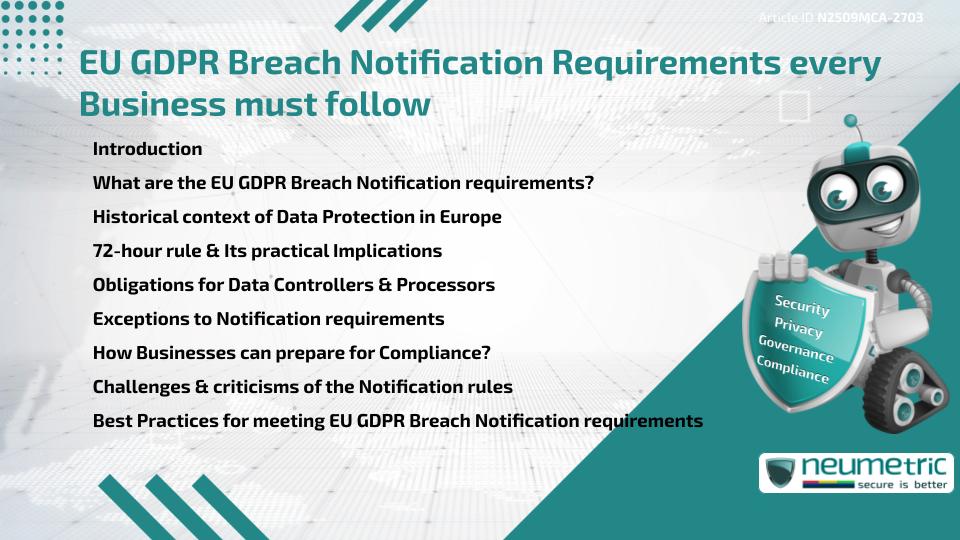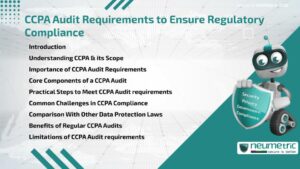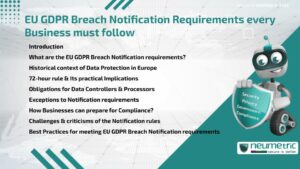Table of Contents
ToggleIntroduction
The EU GDPR Breach Notification requirements are among the most critical aspects of the General Data Protection Regulation [GDPR] for Businesses operating in or handling data from the European Union. These rules require Organisations to notify Supervisory Authorities & in certain cases, affected Individuals when a Personal Data Breach occurs. Notifications must typically be made within seventy-two (72) hours, unless the Breach is unlikely to result in a Risk to Individual Rights & Freedoms. Companies that fail to comply may face heavy Fines, Reputational damage & loss of Consumer Trust. Understanding these requirements is essential for Businesses to avoid Penalties & safeguard Personal Information.
What are the EU GDPR Breach Notification requirements?
The EU GDPR Breach Notification requirements mandate that data Controllers report Personal Data Breaches to the relevant supervisory authority without undue delay, ideally within seventy-two (72) hours. If the delay is longer, Organisations must provide reasons. In addition, if the Breach is likely to result in a high Risk to Individuals, the Company must inform affected Data Subjects promptly. Processors, while not responsible for notifying Authorities, must inform the controller as soon as they become aware of a Breach.
Historical context of Data Protection in Europe
Europe has long emphasised Privacy as a fundamental right. Before GDPR came into effect in 2018, Data Protection laws varied widely across EU member states. The Data Protection Directive of 1995 created a foundation but lacked the enforcement power & uniformity GDPR introduced. The EU GDPR Breach Notification requirements marked a shift from optional or inconsistent reporting toward a standardised, binding Framework across the entire EU.
72-hour rule & Its practical Implications
The seventy-two (72) hour deadline is one of the most challenging aspects of Compliance. It forces Companies to have effective Incident Detection, Investigation & Reporting mechanisms in place. The rule does not require full details at the time of Notification; Organisations can provide information in phases, as long as they maintain transparency. This ensures a balance between swift Regulatory Awareness & thorough Investigation.
Obligations for Data Controllers & Processors
Data Controllers carry the main responsibility for meeting the EU GDPR Breach Notification requirements. They must assess the severity of a Breach, notify the Supervisory Authority & communicate with Individuals if needed. Processors, on the other hand, must report Breaches to Controllers without delay but are not directly liable for notifying Regulators or Data Subjects. This division of responsibility ensures clarity in Accountability between Business partners.
Exceptions to Notification requirements
Not all Breaches require Reporting. If a Breach is unlikely to pose a Risk to the Rights & Freedoms of natural persons, Organisations may be exempt from Notification. For example, if Encrypted data is compromised but remains unreadable without the decryption key, the Risk to Individuals may be minimal. However, Companies must carefully document their reasoning for not notifying, as Supervisory Authorities can request justification.
How Businesses can prepare for Compliance?
To meet the EU GDPR Breach Notification requirements, Companies should establish an Internal Incident Response Plan, conduct regular Risk Assessments & train Employees on identifying potential Breaches. Strong Encryption, Access Controls & Data Minimisation strategies can reduce the severity of Breaches & the Likelihood of Notification obligations. Regular Drills & Tabletop exercises also help Businesses practice the seventy-two (72) hour reporting timeline.
Challenges & criticisms of the Notification rules
Some Businesses argue that the seventy-two (72) hour window is too strict, especially for Organisations with complex IT Systems. Others highlight that frequent Notifications, even for minor Breaches, may overwhelm both Regulators & Individuals. Critics suggest that the emphasis on speed may come at the cost of accuracy, leading to incomplete or premature Notifications. Nonetheless, the rules prioritise protecting Individuals’ rights over Business convenience.
Best Practices for meeting EU GDPR Breach Notification requirements
Organisations can reduce Risks by:
- Appointing a dedicated Data Protection Officer [DPO]
- Establishing a cross-functional Breach Response Team
- Maintaining detailed Incident Logs & Breach Documentation
- Using robust Encryption & Pseudonymisation methods
- Reviewing & updating Breach Response Plans annually
Takeaways
- Notify Supervisory Authorities within seventy-two (72) hours of a Breach
- Inform Individuals if the Breach poses high Risks to their Rights
- Controllers bear main responsibility; Processors must alert Controllers
- Some Breaches are exempt, but justification must be documented
- Training, Planning & Encryption are key to Compliance
FAQ
What are the EU GDPR Breach Notification requirements?
They require Organisations to notify Supervisory Authorities within seventy-two (72) hours of discovering a Personal Data Breach & in some cases, affected Individuals.
Who is responsible for notifying Authorities under GDPR?
Data Controllers must notify Supervisory Authorities. Processors only need to inform Controllers when a Breach occurs.
Do all Data Breaches have to be reported?
No. Only Breaches that pose a Risk to the Rights & Freedoms of Individuals require Notification.
What happens if a Company misses the seventy-two (72) hour deadline?
Companies must explain the reason for the delay. Repeated or unjustified failures may result in Fines.
Is Encryption a valid reason to avoid Notification?
Yes, if data is securely encrypted & unreadable to unauthorised parties, Notification may not be necessary.
Do Businesses outside the EU need to comply with these requirements?
Yes, if they handle Personal Data of EU Residents, they must comply with the EU GDPR Breach Notification requirements.
Can Notifications be submitted in Stages?
Yes. Organisations can submit initial details within seventy-two (72) hours & provide updates as investigations continue.
How can Businesses prepare for GDPR Breach Notifications?
By creating Incident Response Plans, training Employees & conducting regular Risk Assessments.
Need help for Security, Privacy, Governance & VAPT?
Neumetric provides organisations the necessary help to achieve their Cybersecurity, Compliance, Governance, Privacy, Certifications & Pentesting needs.
Organisations & Businesses, specifically those which provide SaaS & AI Solutions in the Fintech, BFSI & other regulated sectors, usually need a Cybersecurity Partner for meeting & maintaining the ongoing Security & Privacy needs & requirements of their Enterprise Clients & Privacy conscious Customers.
SOC 2, ISO 27001, ISO 42001, NIST, HIPAA, HECVAT, EU GDPR are some of the Frameworks that are served by Fusion – a SaaS, multimodular, multitenant, centralised, automated, Cybersecurity & Compliance Management system.
Neumetric also provides Expert Services for technical security which covers VAPT for Web Applications, APIs, iOS & Android Mobile Apps, Security Testing for AWS & other Cloud Environments & Cloud Infrastructure & other similar scopes.
Reach out to us by Email or filling out the Contact Form…





